K-State Current
K-State Current - March 30, 2022
K-State Current is a weekly news update for the Kansas Board of Regents to apprise the Regents on a few of the many successes and achievements made by K-State faculty, staff, and students.

K-State News
Feed the Future Innovation Lab for the Reduction of Post-Harvest Loss kicks off $1 million costed extension
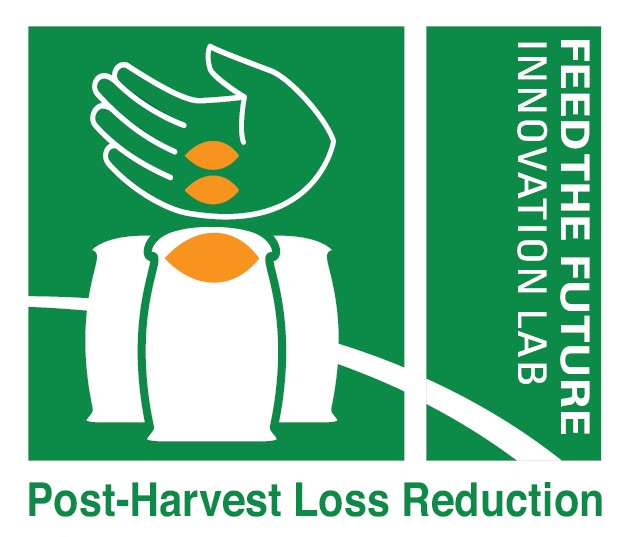 The College of Agriculture's Feed the Future Innovation Lab for the Reduction of Post-Harvest Loss has received a costed extension from the U.S. Agency for International Development for a ninth year of program activities. This uncommon second costed extension for an innovation lab was awarded in recognition of the significant success the lab has realized in moving research innovations into scaling.
The College of Agriculture's Feed the Future Innovation Lab for the Reduction of Post-Harvest Loss has received a costed extension from the U.S. Agency for International Development for a ninth year of program activities. This uncommon second costed extension for an innovation lab was awarded in recognition of the significant success the lab has realized in moving research innovations into scaling.
Two centers in USAID's Bureau for Resilience and Food Security joined forces to fund the extension: the Nutrition Center — which hosts the Post-Harvest Loss Innovation Lab — and the Agriculture-Led Growth Center — the innovation lab's original hosting center. With this further support, the lab will continue the scaling of postharvest technologies and practices to reduce food loss, focusing on Ghana and Bangladesh.
The program will continue multidisciplinary research to glean insights and further refine scaling strategies to ensure innovations scale with inclusive benefits across the food system. Year nine will extend research and partnerships to propel successful technologies along the product life cycle and into sustainable use.
On Jan. 25 and 27, the Post-Harvest Loss Innovation Lab held a year nine kickoff meeting attended by partners, including strong engagement from eight colleagues at USAID. The annual meeting successfully catalyzed ongoing conversations with several of these USAID colleagues, focused on critical research and scaling considerations.
In Ghana year nine activities, the innovation lab will coalesce its eight previous years of work across the food system to galvanize linkages between smallholder farmers, poultry producers, private sector partners and other key actors to ensure sustainable reduction of postharvest loss issues beyond the life of the program. Specifically, this will include activities around expanded support to the Women in Poultry Association; further characterization of improved poultry performance with properly stored feed, a key adoption consideration; research and dissemination of elevated platforms to reduce aflatoxin accumulation in corn; adaptation of the Arc'teryx tent solar dryer; expanded engagement to address postharvest losses with resource-poor smallholder farmers in Northern Ghana; expanding relationships with key agricultural extension advisors of the Ministry of Agriculture; and supporting the mayor of Accra's plan to transform the urban food system to reduce food loss and waste. An already flourishing private sector partnership with Sesi Technologies, led by young entrepreneur Isaac Sesi and manufacturer of the GrainMate moisture meter, will continue to be fostered as the company grows to meet increasing market demand for low-cost grain drying technologies and general postharvest management.
In Bangladesh, year nine project activities will continue to be led by Bangladesh Agricultural University, with strong support from University of Illinois' ADM Institute for the Prevention of Postharvest Loss. Activities include testing and adaptation of a Post-Harvest Loss Innovation Lab-developed 12-ton rice mill dryer that the lab team adapted for high performance and capacity to dry both paddy and parboiled rice, which previously required two separate dryers. It is estimated that more than 1 million smallholder farmers will benefit from 25% of the nation's mills adopting this technology. To safeguard the national seed supply, trials of GrainPro hermetic cocoons will continue with the government's Bangladesh Agricultural Development Corporation. Given the importance of nutrient-dense perishables to nutrition, the Post-Harvest Loss Innovation Lab will work with Bangladesh Agricultural University to adapt the Arc'teryx tent solar dryer for perishable high-nutrient foods as well as grains, with leadership from K-State Olathe's Postharvest Physiology Lab.
Finally, a key part of why USAID awarded a ninth year, the innovation lab will continue supporting scale-up of the widely accepted Post Harvest Loss Innovation Lab BAU-STR dryer throughout the country. Of importance, the government of Bangladesh's national agricultural mechanization subsidy program will support local smallholder producers interested in purchasing a BAU-STR dryer.
Given the tremendous challenges and instability faced in Ethiopia, year nine will also enable the innovation lab to wrap up key activities, especially supporting graduate students toward completion.
Expert collaborators from across multiple disciplines and institutions will continue to contribute to this work. The project team will continue to be led by Jagger Harvey of K-State's plant pathology department as the primary principal investigator. Key leadership team members in year nine include George Opit of Oklahoma State University as the principal investigator of Ghana; Georgina Bingham, University of Nebraska-Lincoln ; and Eleni Pliakoni, horticulture and natural resources department, and Tricia Jenkins, postharvest specialist, both at K-State Olathe; Anna Snider, AgReach, international agriculture development specialist; Jisang Yu and Ben Schwab, both of the K-State agricultural economics department; Misty Lambert, North Carolina State University; and Jonathan Ulmer, K-State's communication and agricultural education department.
The Innovation Lab for the Reduction of Post-Harvest Loss Management Entity team provides further support and contributions: Jessa Barnard, assistant director; Catherine Hickman, fiscal analyst; and Mamadou Thiam, program coordinator. A range of private sector partners, both in the U.S. and in partner countries, will also be instrumental to the innovation's lab success in year nine.
The lab looks forward to additional partnership opportunities to secure a safe, adequate and nutritious harvest for all.
This work is supported by the Post-Harvest Loss Innovation Lab with funding from USAID as part of Feed the Future, the U.S. government's global hunger and food security initiative.
Twelve Kansas State University alumni selected as 2022 Alumni Fellows
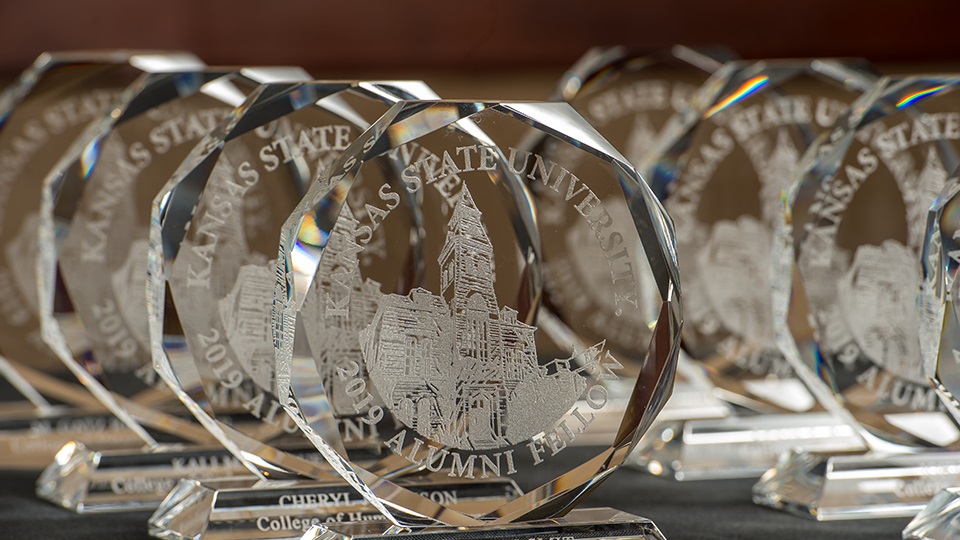 Twelve accomplished Kansas State University alumni have been selected as the 2022 Alumni Fellows and will address students and faculty in classes and receptions April 20-22 during the 2022 Alumni Fellows week.
Twelve accomplished Kansas State University alumni have been selected as the 2022 Alumni Fellows and will address students and faculty in classes and receptions April 20-22 during the 2022 Alumni Fellows week.
Alumni Fellows return to discuss current business and industry trends and to meet with students and faculty. The program is sponsored by the K-State Alumni Association, the Office of the President and the Deans’ Council.
“The Fellows were chosen based on their high levels of professional accomplishment and distinguished service in their respective careers,” said Andrea Bryant Gladin, K-State Alumni Association assistant vice president of alumni programs and organizer of the Alumni Fellows program.
The 2022 Alumni Fellows are:
- Justin Knopf, a fifth-generation family farmer in Central Kansas, Gypsum, Kansas, for the College of Agriculture. Knopf earned a bachelor’s degree in agronomy in 2000.
- Brian Diederich, vice president – interior design for Wynn Design and Development, Henderson, Nevada, for the College of Architecture, Planning and Design. Diederich earned a bachelor’s degree in interior architecture in 1994.
- Mark D. Carlson, M.D., M.A., is chief medical officer and senior vice president at Covanos Inc., Atlanta, Georgia, for the College of Arts and Sciences. Carlson received a bachelor’s degree in biology in 1977.
- Nancy Siepman, retired head of ethics and compliance for the research and development and vaccine business unit at Takeda Pharmaceutical Company Limited, Barrington Hills, Illinois, for the College of Arts and Sciences. Siepman received her master’s and doctorate in statistics from K-State in 1981 and 1988, respectively.
- Greg Case, CEO of Aon, Chicago, Illinois, for the College of Business Administration. Case earned a degree in finance in 1985.
- G.A. Buie, executive director for the United School Administrators of Kansas, Gardner, Kansas, for the College of Education. Buie earned a master’s degree in educational administration in 1996.
- Mark Nyquist, who recently retired as the CEO of DynaTen Corporation, Fort Worth, Texas, for the Carl R. Ice College of Engineering. Nyquist earned a bachelor‘s degree in construction science in 1980.
- Jennifer McDonald, is the founder and CEO at Jenny Dawn Cellars, Wichita, Kansas, for K-State’s Global Campus. McDonald earned a master’s degree in agribusiness through K-State’s Global Campus in 2016.
- Dr. Mary B. Gregoire, professor emeritus at Rush University, Chicago, Illinois, for the Graduate School. Gregoire earned a doctorate in foodservice and hospitality management from K-State in 1985.
- David Relling, PT, Ph.D., associate dean for health sciences and professor of physical therapy at the University of North Dakota, Grand Forks, North Dakota, for the College of Health and Human Sciences. Relling earned a master’s degree in kinesiology from K-State in 1994.
- David G. Delker, retired associate dean and professor emeritus of the K-State College of Technology and Aviation, Salina, Kansas, for the College of Technology and Aviation. Delker earned an associate degree in electronic engineering technology from Kansas Technical Institute in 1973.
- Tolani I. Francisco, DVM, MPH, wild horse and burro coordinator for the U.S. Forest Service, Albuquerque, New Mexico, for the College of Veterinary Medicine. She also owns Native Healing in Laguna, New Mexico. Francisco earned a Doctor of Veterinary Medicine in 1990 from K-State.
For more information about the Alumni Fellows program, visit k-state.com/Fellows.
K-State Faculty Highlights
Marla Day selected as speaker for Humanities Kansas
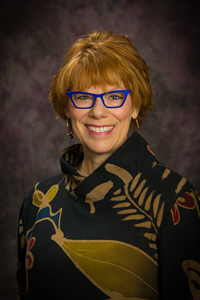 Marla Day, curator for the Historic Costume and Textile Museum was chosen for the 2022 Speakers Bureau hosted by Humanities Kansas. The Humanities Kansas Speakers Bureau engages audiences with in-person and online humanities-based presentations designed to share stories that inspire, spark conversation that inform and generate insights that strengthen civic engagement.
Marla Day, curator for the Historic Costume and Textile Museum was chosen for the 2022 Speakers Bureau hosted by Humanities Kansas. The Humanities Kansas Speakers Bureau engages audiences with in-person and online humanities-based presentations designed to share stories that inspire, spark conversation that inform and generate insights that strengthen civic engagement.
Day’s presentation, ‘Dress for Success: Nelly Don and American Fashion’, will highlight Nell Donnelly, a Parsons native who built a fashion empire on the vision that women deserved affordable, stylish clothing regardless of means or status. From humble beginnings, Don built a company that treated her workforce of women fairly, brought fashion to millions of American women and became the largest dressmaker of the century. Ellen “Nell” Quinlan Donnelly’s story is one of innovation, triumph, and hard work—all rooted in her small-town Kansas upbringing.
Day has been involved with the Historic Costume and Textile Museum since 1998 and was named curator in 2004 with a goal of making the past part of our present. Through the extensive collection of clothing and textile artifacts in the museum’s holdings, we contribute to an understanding of humanity’s cultural past. The collection includes a wide range of items from Byzantine Era children’s clothing to Twentieth-Century Halloween costumes. And from flapper dresses to 1960’s TWA pop-culture uniforms.
The Historic Costume and Textile Museum is housed in the Department of Interior Design and Fashion Studies, College of Health and Human Sciences at Kansas State University. The museum collaborates with area museums to exhibit the collection and promote a broad experience and appreciation for historic dress and culture. The museum welcomes visitors, researchers, and small group tours by appointment only. More information on the museum can be found on their website.
Support for the 2022 Humanities Kansas Speakers Bureau has been provided by the Freedom’s Frontier National Heritage Area, the Friends of Humanities Kansas, the National Endowment for the Humanities’ A More Perfect Union initiative, and the State of Kansas.
For more information about the Speakers Bureau, visit humanitieskansas.org or call 785-357-0359.
Humanities Kansas connects communities with history, traditions, and ideas to strengthen civic life. Humanities Kansas is an independent nonprofit leading a movement of ideas to empower the people of Kansas to strengthen their communities and our democracy. Since 1972, HK’s pioneering programming, and partnerships have documented and shared stories to spark conversations and generate insights. Together with statewide partners and supporters, HK inspires all Kansans to draw on history, literature, ethics, and culture to enrich their lives and to serve the communities and state we all proudly call home.
K-State physicists publish on X-ray lasers taking pictures of complex molecules
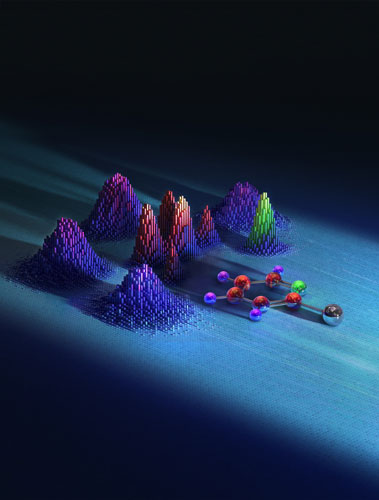 K-State physicists Daniel Rolles and Artem Rudenko, and their graduate student, Xiang Li, are part of an international research team that has published the article "X-ray multiphoton-induced Coulomb explosion images complex single molecules" in Nature Physics, a monthly journal publishing the highest-quality research in all areas of physics, pure and applied.
K-State physicists Daniel Rolles and Artem Rudenko, and their graduate student, Xiang Li, are part of an international research team that has published the article "X-ray multiphoton-induced Coulomb explosion images complex single molecules" in Nature Physics, a monthly journal publishing the highest-quality research in all areas of physics, pure and applied.
The team used the world's largest X-ray laser, the European XFEL, to take pictures of complex molecules. With ultra-bright X-ray flashes, the scientists were able to take snapshots of gas-phase iodopyridine molecules with atomic resolution. In the process, the molecules are exploded by the X-ray laser, and the image is reconstructed from the pieces.
In the method known as Coulomb explosion imaging, a high-intensity and ultra-short X-ray laser pulse knocks out numerous electrons from the molecule. Due to the strong electrostatic repulsion between the remaining, positively charged atoms, the molecule explodes within a few femtoseconds — the millionths of a billionth of a second, the individual atoms fly apart and are registered by a detector.
"Our group and many other researchers have been doing similar Coulomb explosion imaging experiments for a while, but we have never been able to take such crisp and clear images of such a relatively large molecule with this technique before," Rolles said.
"One of the key points here is that we can see all hydrogen atoms, which are hard to image by more conventional techniques like X-ray or electron diffraction," adds Rudenko.
The work published in Nature Physics is part of a broader effort to develop this new imaging technique.
"Recently, our collaboration published a closely-related paper in Physical Review Research, led by our graduate student, Xiang Li, where we have shown that for somewhat simpler molecules, even the full 3D structure can be captured," Rudenko said.
The images are an important step toward recording molecular movies, which researchers hope to use in the future to observe details of biochemical, chemical and physical reactions with high resolution.
"Seeing how well this works with the extremely short X-ray pulses from an X-ray free-electron laser such as the European XFEL got us really excited about the prospect of being able to take molecular movies of photochemical reactions in complex molecules that are a bit more exciting than simple diatomics or triatomics, and are relevant for many technological applications," Rolles said.
This realization is particularly timely since the SLAC National Lab in Stanford is about to start its upgraded high-repetition-rate X-ray laser, LCLS-2 this fall, which will deliver 1,000 times more pulses per second than the current version used so far. Combing these incredibly high repetition rates with the demonstrated Coulomb explosion imaging technique promises to revolutionize the field of molecular "movie making," which will benefit such important technological areas as solar energy conversion, photocatalysis and artificial photosynthesis.
"We have recently received more than $1.1 million in funding from the National Science Foundation to purchase a high repetition rate, 100-kHz femtosecond laser for our lab here at K-State," Rudenko said. "With this new laser and the things we have learned about Coulomb explosion imaging, we are hoping to be able to take similar movies here as well."
Rolles and Rudenko work at the J.R. Macdonald Laboratory at the K-State physics department, which is one of the most active centers for atomic, molecular and optical physics in the United States. Similar to SLAC, the lab is funded by the U.S. Department of Energy. Li is now working at SLAC National Accelerator Laboratory.
The work was performed by a large international research team led by Rebecca Boll from the European XFEL, which included researchers from the universities of Hamburg, Frankfurt, and Main and Kassel, Jiao Tong University in Shanghai, Kansas State University, the Max Planck Institutes for Medical Research and for Nuclear Physics, the Fritz Haber Institute of the Max Planck Society, the U.S. accelerator center SLAC, the Hamburg Cluster of Excellence CUI: Advanced Imaging of Matter, the Center for Free-Electron Laser Science at DESY, DESY and European XFEL.
K-State Student News
K-State Sales Team takes home sixth place at National Collegiate Sales Competition
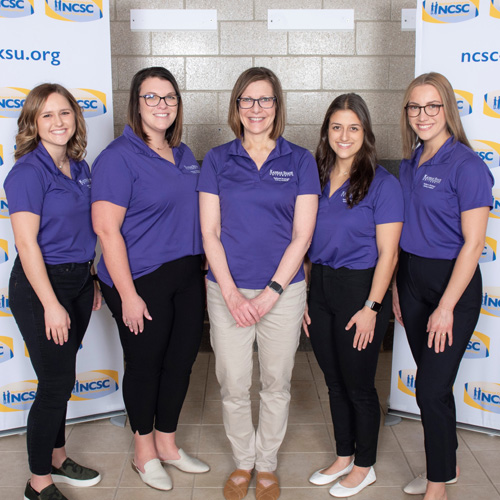 The K-State Sales Team competed in the National Collegiate Sales Competition March 4–7. The competition was hosted by Kennesaw State University in Kennesaw, Georgia, with Gartner as the product sponsor. Sixty-seven universities and 133 competitors participated, with more than 35 companies on hand to hire the next generation of sales talent.
The K-State Sales Team competed in the National Collegiate Sales Competition March 4–7. The competition was hosted by Kennesaw State University in Kennesaw, Georgia, with Gartner as the product sponsor. Sixty-seven universities and 133 competitors participated, with more than 35 companies on hand to hire the next generation of sales talent.
The K-State Sales Team had two students compete in the role-play competition. The team consisted of Jacqueline Anzalone, senior in marketing and supply chain management, Kansas City, Missouri, and Lydia Johnson, junior in professional strategic selling and Spanish, Prior Lake, Minnesota. Natalie Beck, junior in marketing, Jefferson City, Missouri, was selected as a student alternate to travel with the team and compete in speed selling events.
Students competed in role-play scenarios selling Gartner for CIOs to various industries. Each role-play was 20 minutes, where students were tasked with uncovering the needs of the prospect through effective questioning and selling the prospect on the value Gartner could provide them in their current situation. Johnson advanced to the semifinals, placing in the top 12 in the competition, and Anzalone advanced to the quarterfinals, placing in the top 54. The team took home sixth place overall in the competition.
“I want to thank Terry Loe, professor of marketing at Kennesaw State University and executive director of the National Collegiate Sales Competition, as well as Gartner and many others for providing this opportunity for our students,” said Kellie Jackson, managing director of the National Strategic Selling Institute and sales team coach. “After being virtual the past two years, it was great to see everyone back in person once again, as it makes the experience that much more memorable for the students and company representatives. I’m extremely proud of our students’ efforts and hard work leading up to and during the competition to secure another top 10-team placing.”
The K-State Sales Team is in the College of Business Administration’s National Strategic Selling Institute, which has been named one of the top sales programs in the country for 10 straight years by the Sales Education Foundation. The team consists of students who are enrolled in the certificate or major in professional strategic selling. In fall 2018, Kansas State University became one of 19 universities in the U.S. to offer a major in professional strategic selling. Students can also earn a certificate in professional strategic selling, which is open to all majors at the university. The professional strategic selling program introduces students to the fundamentals of sales and the innovative curriculum and sales labs allow students to develop the skills needed to be successful.
The K-State Sales Team will be competing in several competitions throughout the school year across the country. For more information on the National Strategic Selling Institute or the K-State Sales Team, please contact kstatesalesprogram@k-state.edu.
The National Collegiate Sales Competition is the largest and longest-running university sales role-play competition in existence. It is also the most prominent sales role-play competition for college students who wish to pursue careers in professional sales, while providing students with unparalleled sales training. This event was built on the core values of professionalism, talent match, skill enhancement and communication, which are still in place today.